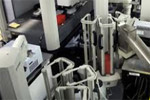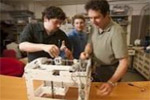Economy |
|
Ekonomija |
The surprising comeback of the British car industry

|
|
Iznenađujući povratak britanske automobilske industrije

|
Science |
|
Znanost |
Physicists are in a celebratory mood

|
|
Fizičari su u slavljeničkom raspoloženju

|
Robo-scientist makes gene discovery on its own

|
|
Robotički znanstvenik samostalno otkriva gene

|
Scientifically ignorant computer derives natural laws from raw data

|
|
Znanstveno neupućeno računalo izvodi prirodne zakone iz neobrađenih podataka

|
Technology |
|
Tehnologija |
Communication using thought alone

|
|
Komunikacija samo uz pomoć misli

|
Ecology |
|
Ekologija |
Experts say we should bury leftover plutonium

|
|
Stručnjaci kažu da bismo trebali zakopati ostatke plutonija

|
Nature |
|
Priroda |
Long-life babies are born in autumn

|
|
Dugovječna se djeca rađaju u jesen

|
Cuisine |
|
Kulinarstvo |
Blueberry summer salad

|
|
Ljetna salata od borovnice

|
|
|
|
|

The surprising comeback of the British car industry
Over the past three decades, few turnarounds have been as remarkable as the one experienced by the British car industry.
Hamstrung by incompetent management and adversarial labour relations, the sector appeared to have reached the end of the road in the 1970s and 1980s.
The industry is now coming back.
Between 2009 and 2011, production increased from 1.1 million to 1.5 million cars.
And with the inflation-adjusted value of the average car produced rising by about 30 per cent over the past 15 years, 2012 is likely to be the first year since the 1970s that the UK has registered a trade surplus in the sector.
The success of British car manufacturing is all the more remarkable given what is happening in the rest of Europe.
Last week PSA Peugeot Citroen unveiled €819 million of net losses for the first six months of 2012.
Other producers are suffering too, struggling with weak demand and chronic overcapacity.
The seeds of this British success story were sown at the end of the 1980s, when the government led by Margaret Thatcher encouraged foreign companies to move production to the United Kingdom...
 Search for more... Search for more...
Over the past three decades, few turnarounds have been as remarkable as the one experienced by the British car industry.
Hamstrung by incompetent management and adversarial labour relations, the sector appeared to have reached the end of the road in the 1970s and 1980s.
The industry is now coming back.
Between 2009 and 2011, production increased from 1.1 million to 1.5 million cars.
And with the inflation-adjusted value of the average car produced rising by about 30 per cent over the past 15 years, 2012 is likely to be the first year since the 1970s that the UK has registered a trade surplus in the sector.
The success of British car manufacturing is all the more remarkable given what is happening in the rest of Europe.
Last week PSA Peugeot Citroen unveiled €819 million of net losses for the first six months of 2012.
Other producers are suffering too, struggling with weak demand and chronic overcapacity.
The seeds of this British success story were sown at the end of the 1980s, when the government led by Margaret Thatcher encouraged foreign companies to move production to the United Kingdom.
Nissan came first, quickly followed by two other Japanese companies, Honda and Toyota.
These two companies, and the Indian group Tata, which has acquired Jaguar Land Rover, account for most of the £20 billion of investment made in the industry over the past two decades.
Just as important was the improvement in industrial relations.
Unions have been co-operative with the management.
Their decision to go along with greater labour flexibility has allowed UK to attract more foreign investment, which in turn has led to higher rates of job creation.
UK should now build on this success story by developing a local supply chain for its producers.
While car manufacturing has expanded, many of the components are still imported.
This is why UK should try to overcome its shortage of technical skills by increasing the number of graduates in subjects such as engineering, and by encouraging more of them to move into manufacturing.
As the economy struggles to pick up from a double-dip recession, the success of the car industry should be a cause for rejoicing.
UK will probably not regain its status as the largest workshop of the world, but with the right policies it can still play a global role in manufacturing.
» Search for more...
|
|

Iznenađujući povratak britanske automobilske industrije
Malo je preokreta tijekom protekla tri desetljeća bilo toliko zapanjujuće kao preokret kojeg trenutno doživljava britanska automobilska industrija.
Sputan nesposobnom upravom i suparničkim radnim odnosima, činilo se da je ovaj sektor stigao do kraja puta 1970-ih i 1980-ih godina.
Industrija se sada vraća.
Između 2009. godine i 2011. godine proizvodnja se povećala s 1,1 milijuna na 1,5 milijuna automobila.
A s obzirom na to da je vrijednost prosječnog proizvedenog automobila rasla za oko 30 posto tijekom proteklih 15 godina zbog prilagodbe na inflaciju, 2012. godina će vjerojatno biti prva godina od 1970-ih u kojoj je Ujedinjeno Kraljevstvo zabilježilo trgovinski suficit u tom sektoru.
Uspjeh britanske proizvodnje automobila još više zapanjuje s obzirom na ono što se događa u ostatku Europe.
Prošlog je tjedna grupacija PSA Peugeot Citroen objavila 819 milijuna eura neto gubitka za prvih šest mjeseci 2012. godine.
I ostali proizvođači također trpe gubitke i bore se sa slabom potražnjom i kroničnim viškom proizvodnog kapaciteta.
Sjeme ove priče o britanskom uspjehu zasijano je krajem 1980-ih godina, kada je vlada na čelu s Margaret Thatcher potaknula strane tvrtke da presele proizvodnju u Ujedinjeno Kraljevstvo...
 Potraži više... Potraži više...
Malo je preokreta tijekom protekla tri desetljeća bilo toliko zapanjujuće kao preokret kojeg trenutno doživljava britanska automobilska industrija.
Sputan nesposobnom upravom i suparničkim radnim odnosima, činilo se da je ovaj sektor stigao do kraja puta 1970-ih i 1980-ih godina.
Industrija se sada vraća.
Između 2009. godine i 2011. godine proizvodnja se povećala s 1,1 milijuna na 1,5 milijuna automobila.
A s obzirom na to da je vrijednost prosječnog proizvedenog automobila rasla za oko 30 posto tijekom proteklih 15 godina zbog prilagodbe na inflaciju, 2012. godina će vjerojatno biti prva godina od 1970-ih u kojoj je Ujedinjeno Kraljevstvo zabilježilo trgovinski suficit u tom sektoru.
Uspjeh britanske proizvodnje automobila još više zapanjuje s obzirom na ono što se događa u ostatku Europe.
Prošlog je tjedna grupacija PSA Peugeot Citroen objavila 819 milijuna eura neto gubitka za prvih šest mjeseci 2012. godine.
I ostali proizvođači također trpe gubitke i bore se sa slabom potražnjom i kroničnim viškom proizvodnog kapaciteta.
Sjeme ove priče o britanskom uspjehu zasijano je krajem 1980-ih godina, kada je vlada na čelu s Margaret Thatcher potaknula strane tvrtke da presele proizvodnju u Ujedinjeno Kraljevstvo.
Nissan je stigao prvi, a ubrzo su stigle i druge dvije japanske tvrtke, Honda i Toyota.
Te dvije tvrtke, zajedno s indijskom grupacijom Tata koja je preuzela Jaguar Land Rover, sačinjavaju veći dio ulaganja u iznosu od 20 milijuna funti u ovu industriju tijekom posljednja dva desetljeća.
Jednako je važno bilo poboljšanje u industrijskim odnosima.
Sindikati su surađivali s menadžmentom.
Njihova odluka da se slože s većom fleksibilnošću rada omogućila je Ujedinjenom Kraljevstvu da privuče više stranih ulaganja, što je pak dovelo do viših stopa stvaranja novih radnih mjesta.
Ujedinjeno Kraljevstvo bi sada trebalo unaprijediti ovu priču o uspjehu razvojem lokalnog lanca opskrbe za svoje proizvođače.
Iako je proizvodnja automobila povećana, mnoge od komponenti još se uvijek uvoze.
To je razlog zbog kojeg bi Ujedinjeno Kraljevstvo trebalo pokušati riješiti svoj manjak tehničkih vještina povećavanjem broja studenata u područjima poput strojarstva i poticanjem većeg broja njih da se presele u proizvodnju.
Dok se gospodarstvo bori da se izvuče iz recesije s dvostrukim dnom, uspjeh automobilske industrije trebao bi biti razlog za radost.
Ujedinjeno Kraljevstvo vjerojatno neće povratiti svoj status najveće svjetske radionice, ali uz pravu politiku još uvijek može imati globalnu ulogu u proizvodnji.
» Potraži više...
|
|
|
|
|

Physicists are in a celebratory mood
When Higgs and others first conceived of the idea of a field that gives rise to mass, almost half a century ago, they could not have expected evidence for their theory to eventually come from an international collaboration of thousands of people operating the most complex machine ever built.
What is there to celebrate?
In some ways, the most honest answer is that we're not quite sure yet.
Most of the possibilities that were on the table when the LHC first powered up are still on the table.
But there are ample grounds for celebration, whatever the new particle turns out to be.
It could be that CERN, near Geneva, Switzerland, has found exactly what was predicted - the boson completing the standard model of particle physics.
That would be an intellectual triumph; a tribute to the power of the human mind - or rather, many minds working through the scientific method - to decipher the cosmos...
 Search for more... Search for more...
|
|

Fizičari su u slavljeničkom raspoloženju
Kada su Higgs i ostali prvi put dobili ideju o polju koje uzrokuje masu, prije gotovo pola stoljeća, nisu mogli očekivati da će se dokazi njihove teorije na kraju pojaviti kao rezultat međunarodne suradnje tisuća ljudi koji upravljaju najsloženijim strojem ikad izgrađenim.
Što treba proslaviti?
Na neki način, najiskreniji odgovor je da još uvijek nismo sasvim sigurni.
Većina mogućnosti koje su bile na stolu kada je LHC prvi put upaljen još se uvijek nalazi na stolu.
No, postoje brojni razlozi za slavlje, bez obzira na to kakvom se nova čestica na kraju pokaže.
Moglo bi biti da je CERN, u blizini Ženeve u Švicarskoj, pronašao upravo ono što je bilo predviđeno - bozon koji popunjava standardni fizički model čestice.
Bio bi to intelektualni trijumf; priznanje moći ljudskog uma - ili, bolje rečeno, mnogih umova koji su radili koristeći znanstvene metode - na dešifriranju svemira...
 Potraži više... Potraži više...
|

Robo-scientist makes gene discovery on its own
Here comes news of a robot that doesn't need to bother with any human thought at all.
It's a "robot scientist" that researchers believe to be the first machine to independently come up with new scientific findings.
Aptly, the robot is named Adam.
While we've become accustomed to robots built to repeat a given task many times over, scientists at Aberystwyth University in Wales and the UK's University of Cambridge designed Adam to take a more human approach to scientific inquiry.
And while it may not win the Nobel Prize for physics just yet, Adam appears to be doing impressively well for a young scientist, carrying out scientific research automatically, without the need for further human intervention...
 Search for more... Search for more...
|
|

Robotički znanstvenik samostalno otkriva gene
Stižu nam vijesti o robotu koji se ne treba zamarati nikakvim ljudskim mislima.
To je "robot znanstvenik", a znanstvenici vjeruju da je to prvi stroj koji može samostalno doći do novih znanstvenih otkrića.
Prikladno, robot je dobio ime Adam.
Iako smo navikli graditi robote da ponavljaju određeni posao mnogo puta za redom, znanstvenici na sveučilištu Aberystwyth u Walesu i na Sveučilištu Cambridge u Ujedinjenom Kraljevstvu projektirali su Adama da zauzme pristup znanstvenim istraživanjima koji je više nalik ljudskom.
Iako zasad vjerojatno neće dobiti Nobelovu nagradu za fiziku, čini se da Adam radi impresivno dobro za mladog znanstvenika i da provodi znanstvena istraživanja automatski, bez potrebe za dodatnom intervencijom od strane čovjeka...
 Potraži više... Potraži više...
|

Scientifically ignorant computer derives natural laws from raw data
If Isaac Newton had had access to a supercomputer, he'd have had it watch apples fall and let it figure out what that meant.
But the computer would have needed to run an algorithm developed by Cornell researchers that can derive natural laws from observed data.
The researchers have taught a computer to find regularities in the natural world that represent natural laws - without any prior scientific knowledge on the part of the computer.
They have tested their method, or algorithm, on simple mechanical systems and believe it could be applied to more complex systems ranging from biology to cosmology and be useful in analyzing the mountains of data generated by modern experiments that use electronic data collection.
The research is described by Hod Lipson, associate professor of mechanical and aerospace engineering, and graduate student Michael Schmidt, a specialist in computational biology.
Their process begins by taking the derivatives of every variable observed with respect to every other - a mathematical way of measuring how one quantity changes as another changes.
Then the computer creates equations at random using various constants and variables from the data...
 Search for more... Search for more...
|
|

Znanstveno neupućeno računalo izvodi prirodne zakone iz neobrađenih podataka
Da je Isaac Newton imao pristup superračunalu, koristio bi ga za promatranje pada jabuka i ostavio da shvati što to znači.
Međutim, to bi računalo trebalo koristiti algoritam razvijen od strane istraživača s Cornella, a koji može izvesti prirodne zakone iz opaženih podataka.
Istraživači su naučili računalo da otkriva pravilnosti u prirodnom svijetu koje predstavljaju prirodne zakone – bez ikakvog prethodnog znanstvenog znanja od strane računala.
Oni su testirali svoju metodu, odnosno algoritam, na jednostavnim mehaničkim sustavima i vjeruju da bi se ona mogla primijeniti na složenije sustave, od biologije do kozmologije, i da bi mogla biti korisna u analiziranju mnoštva podataka koje su stvorili suvremeni eksperimenti koji koriste elektroničko prikupljanje podataka.
To istraživanje opisali su Hod Lipson, izvanredni profesor strojarstva i aeronautičkog inženjeringa, i postdiplomski student Michael Schmidt, specijalist u području računalne biologije.
Njihov proces započinje uzimanjem derivacija svake varijable promatrane u odnosu na svaku drugu, što je matematički način mjerenja promjene jedne količine zbog promjene druge.
Tada računalo nasumično stvara jednadžbe koristeći razne konstante i varijable iz podataka...
 Potraži više... Potraži više...
|
|
|
|
|

Communication using thought alone
Technology has helped Stephen Hawking in many ways, and now it might allow him to communicate using thought alone.
The cosmologist is trialling a device that monitors brain activity with the ultimate aim of transforming it into speech.
Hawking has motor neurone disease - nerve decay that has left him almost completely paralysed.
He currently communicates using a series of cheek twitches to select words from a screen.
"It is a very, very slow process", says Philip Low at Stanford University in California, who is founder of healthcare company NeuroVigil.
In a preliminary trial, Hawking was asked to imagine moving his hands and feet while wearing the device.
Scientists were able to identify what movement he was imagining through changes in his brain activity...
 Search for more... Search for more...
|
|

Komunikacija samo uz pomoć misli
Tehnologija je pomogla Stephenu Hawkingu na mnogo načina, a sada bi mu mogla omogućiti i komunikaciju samo uz pomoć misli.
Kozmolog testira uređaj koji prati moždane aktivnosti, a čiji je krajnji cilj pretvoriti ih u govor.
Hawking ima motoričku neuronsku bolest - propadanje živaca koje ga je ostavilo gotovo potpuno paraliziranim.
On trenutno komunicira koristeći niz grčeva na obrazu kako bi odabrao riječi na zaslonu.
"To je vrlo, vrlo spor proces", kaže Philip Low sa Sveučilišta Stanford u Kaliforniji, osnivač zdravstvene tvrtke NeuroVigil.
U preliminarnom je testiranju Hawkinga zamoljen da zamisli kako miče svoje ruke i noge tijekom nošenja uređaja.
Znanstvenici su mogli prepoznati koji pokret je zamislio zbog promjena u njegovoj moždanoj aktivnosti...
 Potraži više... Potraži više...
|
|
|
